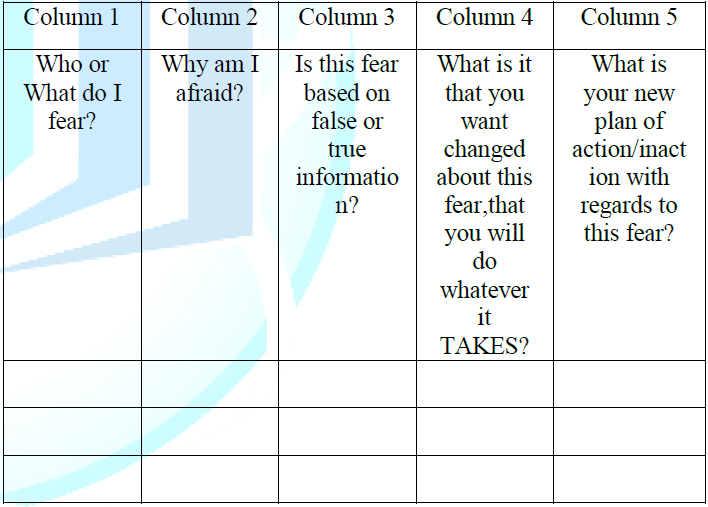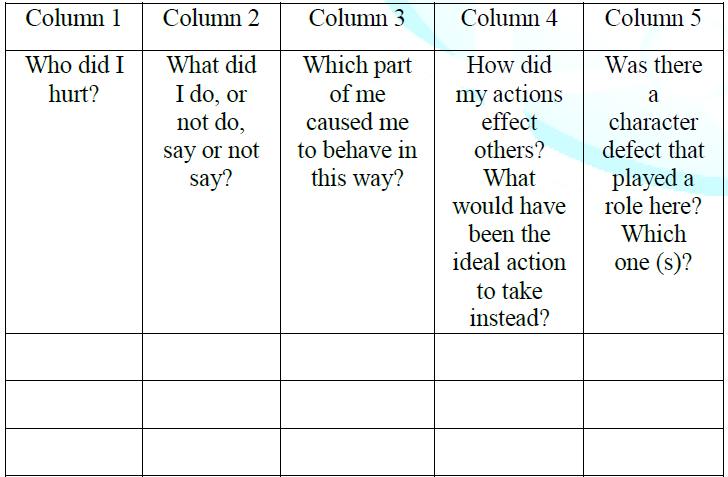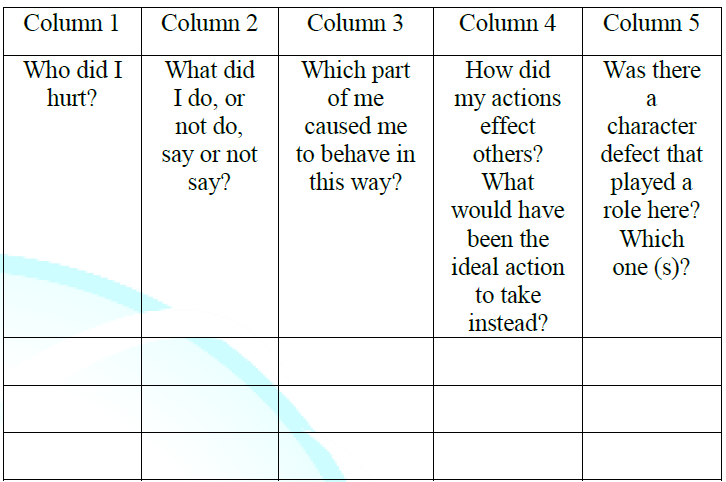Introduction
Resentment is a consequence of unfair, abusive treatment,
and a perception of wrongdoing. It is also referred to as bitterness or hatred.
Often resentments are fueled by feelings of disappointment, anger, rage,
sadness, disgust, fear, pain, shame or shock, in regard to a particular
incident(s). Resentments can form as a result of being taken advantage of,
jealousy, envy, thoughtless acts, or engagement with a repeated harmful
pattern. Sometimes these patterns are self-imposed in adulthood, where one
unconsciously, or consciously, repeatedly seeks out the same underlying
patterns of hurt, negativity, injustice or isolates themselves; in response to
their personal unprocessed hurts. The resentment can feel like a perpetual
unrest, a constant repetition of thoughts and feelings tied to the original
hurtful event.
The possible benefit to writing out a resentment inventory is the letting go of the negative emotions, and a change of dysfunctional behavioral patterns that are a reflection of these wounds. It is well-known that negative emotions are harmful to your emotional health and can impact your quality of life. Writing out a resentment inventory may help you gain conscious awareness of your personal reality, or personal filter system. I define personal reality as your feelings, thoughts, behaviors, habits and beliefs. This conscious awareness is crucial because most of your life experiences are filtered through your personal reality. Bringing your personal filter system to the surface will enable you to effect long-term changes of conditions and resolve the causes of your problematic patterns. When writing a personal inventory, the patterns of how you reacted to resentments will help you understand your life on a much different level than you may have up to this point (Table 1).

Table 1: Sample Fear Inventory
Set Aside Your Broken Tools
The purpose of a Personal Inventory (lists of your
resentments, fears, sex conduct and review of harms other than sexual) is to
help you identify what broken tools continue to have power over your life
experiences. A personal inventory is not a self-blaming, shaming or critical
self-analysis. It is not for the purposes of finding fault with yourself, but
rather, an opportunity to inventory your personal toolbox, and upgrade to more
functional tools. It entails a readiness to look within and address what
changes will improve your life. For example, it is very easy to say: I really
want to stop this habit of lying to my spouse (use your own examples), when in
fact, you find it very hard to tell the truth. If you are not aware that it is
hard for you to tell the truth, you will not be able to decide to change it. A
Personal Inventory is a fact-finding, fact-facing, searching, detailed list
that will disclose behavioral problems that are no longer serving you in your
life. It details your personal reality. To sort out what is harmful that you
need to let go of, you need to carefully examine what is your personal reality.
If you are not completely committed to the process of sorting out and
discarding your personal obstructions, you will remain a victim of your own
limiting beliefs, thoughts, feelings and habits. The goal when doing this
inventory is to do it thoroughly and courageously.
Writing a Personal Inventory: A Practical Guide
A Personal Inventory consists of four inventories:
1 - Resentments
2 - Fears
3 - Sex Conduct
4 - Harms done to others
Resentment is a re-feeling (think re-sentiment) of anger
whenever you think of something significant. I suggest that you start out with
your most intense resentments and then proceed with the rest of your
resentments. Divide a sheet of paper into five columns and label the columns as
follows:
Column 1: Who or what am I resentful toward?
Column 2: What happened? (Or what did not happen, what did I not receive
or what was taken from me?)
Column 3: Which aspect of me was affected or violated? (Examples: self-esteem,
pride, personal relationships, physical assets, ability to trust, emotions).
Column 4: What did I do or not do? Here you are looking for your own
mistakes, if there were any, to contribute to this situation. If you were
abused as a minor, state that. Children are never responsible for their abuse.
If you were a victim and did not contribute to what happened, state that as
well.
Column 5: Which, if any, character-defects may have played a role in
this? (If you were a child, or were completely innocent as an adult, just state
that). Examples of Character Defects are: Selfish, Self-Seeking, Dishonest,
Fearful, Inconsiderate, Withdrawn, Withholding, Stubborn, Lust, Negativity,
Playing God, Controlling, Revenge, Prideful, Anger, Insecurity, Guilt, Needy,
Self-Pity, Perfectionism, Irresponsible, Broken Word, Denial and Delusion,
Compulsive, Impulsive, Greed, Jealous, Abusive. (Fill in anything that I left
out here).
Helpful Tip: A Personal Inventory is about growth, moving forward and honest self-appraisal. If you are inclined toward self-blame and feel overcome by self-punishment, I suggest that you reach out for support. There is no growth or transformation in self-deprecation (Table 2 and 3).

Table 2: Sample Inventory for Harms other than sexual

Table 3: Sample Sex Conduct Inventory
A Word on Fear
Fear is one of the four primal human emotions: fear, love,
anger and joy. Fear can be a gift that warns you of danger or a real problem
that requires a solution. Fear can also be your own self-crafted illusion. Fear
gets its supremacy to the extent that you avoid facing or feeling it. It also
maintains its influence over you to the exact degree that you run away from it.
Fear is often a gift because it reveals information that you need for your
safety and security; fear can also be debilitating. Looking within is scary-the
blindfold (your defenses) is there for a reason. It is advisable to go slowly
and unveil only what you can handle without re-triggering trauma. The goal of
writing a Fear Inventory is to inquire into the role of fear in your life: What
are your specific fears? Why do you have these fears? How are they related to
your resentments or dependency needs? And finally, are you willing to transform
your fears into a trust for an Infinite Creator and pray for guidance on what
your Creator would have you be (opposite of your fears)?
Post-Inventory Follow-Up
Resentment, as previously described, is when you remember an
incident and you feel anger. You can imagine a red flag going up every time you
are having resentment. After you do a Personal Inventory about it, you can test
to see if you still have resentment. Think about it and notice if the Red Flag
of Resentment is either up or down. I do not want to falsely present a Personal
Inventory as a magic pill that will erase resentments. However, there is
something very powerful about getting your hurt, shame, guilt, fears, harms
done to others, and commitments for amendments, out on paper and reviewing it
in a systematic and analytical way, with the intent for spiritual
transformation. Sometimes a shift in perspective can occur just by letting out
the pain and grief. There are some things that will always be a sore point, and
no amount of inventorying will make a difference. That is okay. The point is to
get out the anger in a way that is safe, organized and concrete.
Conclusion
Dr. Hippolyte Bernheim was the physician who initially used
the word psychotherapy, and, for him, psychotherapy was a process of wakeful
suggestion. Dr. Bernheim espoused that a wakeful suggestion is suggesting
information in a particular state of consciousness so that this information can
transform the patients baseline thoughts. And as a consequence, this transforms
behavior and physiology. Writing out, analyzing, and applying the knowledge and
insights from your personal inventory, is an exciting challenge to accomplish
your own wakeful suggestion.
References
1. Anonymous.
Alcoholics Anonymous (3rd edn) Alcoholics Anonymous World Services, Inc, (1976)
New York.
2. Anonymous.
Twelve Steps and Twelve Traditions, Alcoholics Anonymous World Services, Inc,
(1981) New York.
3. Deventer
J, Wagner J, Lüdtke O and Trautwein U. Are personality traits and relationship
characteristics reciprocally related? Longitudinal analyses of codevelopment in
the transition out of high school and beyond (2018) J Pers Soc Psychol. https://doi.org/10.1037/pspp0000191
4. Deniz
ME and Satici SA. The Relationships between Big Five Personality Traits and
Subjective Vitality (2017) Annals of Psychol 33: 218-224. https://doi.org/10.6018/analesps.33.2.261911
5. Edery
R. Recovery from Narcissistic Abuse through a Spiritual Lens: Who is in Charge?
(2017) J Psyi Psychiatric Dis 244-251. https://doi.org/10.26502/jppd.2572-519X0023
6. Edery
R. The 12 Steps of Alcoholics Anonymous as an Adjunctive Treatment for Trauma
Survivors: An Experimental Approach (2014) Int J Emergency Ment Healt 16:
120.
7. Edery
R. Trauma and Transformation: A 12-Step Guide (2013) New York.
8. Hippolyte
Bernheim. Suggestive Therapeutics; a Treatise on the Nature and Uses of
Hypnotism Hardcover (2015) Andesite Press.
9. Hippolyte
Bernheim. Suggestive therapeutics: a treatise on the nature and uses of
hypnotism (1919) Br Med J 2: 401.
10. Huprich
SK. Reclaiming the Value of Assessing Unconscious and Subjective Psychological
Experience (2011) J Pers Assess 93: 151-160. https://doi.org/10.1080/00223891.2010.542531
11. Kapustin
SA. An existential criterion of normal and abnormal personality in the works of
Carl Jung and Carl Rogers (2016) Psychology in Russia: State of Art 9: 54-68. https://doi.org/10.11621/pir.2015.0301
12. Martin J.
Carl Rogers and B F Skinners approaches to personal and societal improvement: A
study in the psychological humanities (2017) J Theoretical Philosophical
Psychol 37: 214-229. http://dx.doi.org/10.1037/teo0000072
13. Pilarska
A. Contributions of Cognitive-Motivational Factors to the Sense of Identity
(2017) Current Psychol 3: 468. https://doi.org/10.1007/s12144-016-9435-1
*Corresponding author:
Rivka A. Edery, Master of Social Work (MSW), Fordham
University Graduate School of Social Service, USA, Tel: (361) 704-4051, E-mail:
rebecca.edery@gmail.com
Citation:
Keywords
Resentments, Psychology, Self-Assessment in psychotherapy, Character defects, Character inventory, Relationships.


 PDF
PDF